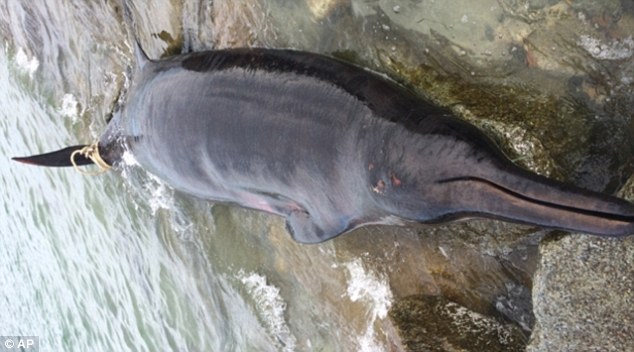-
Tips for becoming a good boxer - November 6, 2020
-
7 expert tips for making your hens night a memorable one - November 6, 2020
-
5 reasons to host your Christmas party on a cruise boat - November 6, 2020
-
What to do when you’re charged with a crime - November 6, 2020
-
Should you get one or multiple dogs? Here’s all you need to know - November 3, 2020
-
A Guide: How to Build Your Very Own Magic Mirror - February 14, 2019
-
Our Top Inspirational Baseball Stars - November 24, 2018
-
Five Tech Tools That Will Help You Turn Your Blog into a Business - November 24, 2018
-
How to Indulge on Vacation without Expanding Your Waist - November 9, 2018
-
5 Strategies for Businesses to Appeal to Today’s Increasingly Mobile-Crazed Customers - November 9, 2018
Rarely-seen deep water whale washed up on beach in Massachusetts
Holidaymakers at Jones Beach, in Plymouth, Massachusetts, were amazed to see the whale, which has a distinctive beak, similar to a bottlenose dolphin.
Advertisement
The whale’s carcass washed up on Jones Beach in Plymouth.
Sowerby’s beaked whales usually swim in depths of up to 5,000ft and dive for up to 30 minutes (Wikipedia) First described by English naturalist James Sowerby in 1804, Sowerby’s beaked whales are reclusive creatures that stay away from ships and are rarely sighted. A number of species of beaked whales are found around 200 miles offshore in the deep North Atlantic.
The whales have long, slender snouts and feed in cold, deep water on small fish. The last time such a whale was spotted in New England was in 2006 in Duxbury.
A necropsy of the whale, which weighs almost a ton, will be performed by the biologists alongside staff from the worldwide Fund for Animal Welfare.
Reportedly, the carcass is in a relatively good condition.
While this can be fairly sad news to find such a big mammal on the shore, but for biologists, this is one of those very rare occasions when they get to study such beaked whales as much of the research remains undone.
Advertisement
This type of whale, due to where it is normally found in nature, is often victim to commercial fisherman’s nets due to accidents.




























